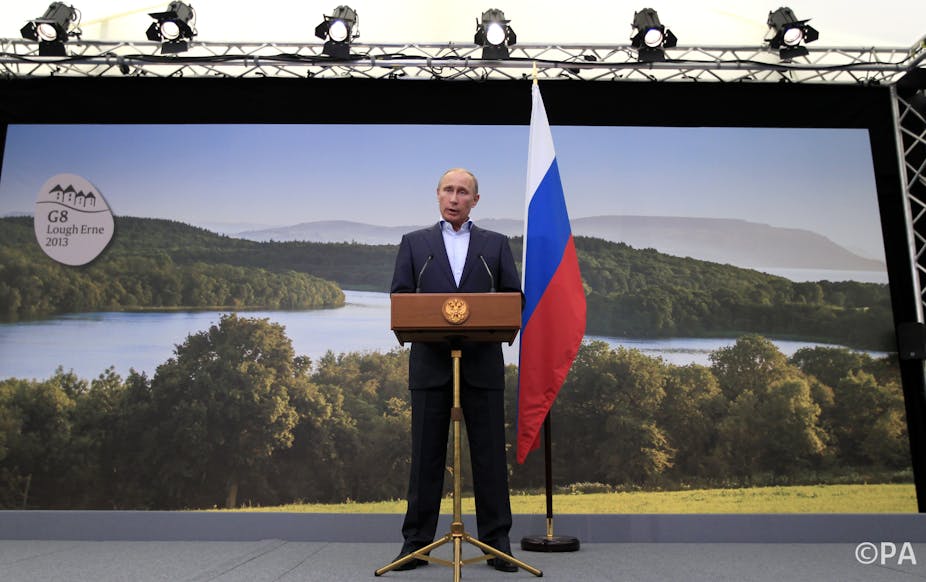Vladimir Putin has drastically restructured Russia’s leading state-owned news agency, RIA Novosti, into a new institution, Russia Today, with the aim of promoting the national image worldwide. Head of the new agency Dmitry Kiselyov is notorious for his conservative, anti-gay and anti-Western views.
The agency was set up by a decree, signed by president Putin and published by Kremlin on Monday morning. The same decree announces the closing of another broadcasting company, Voice of Russia, and merging it with the new structure. State-owned Rossiiskaya Gazeta and magazine Rodina are also to be reorganised.
Until recently RIA Novosti was one of the largest media outlets in Russia (the other two largest news agencies are state-owned ITAR-TASS and a privately-owned, Interfax). The network comprises 40 information resources working in 22 languages with a widespread network of international correspondents. It also included an economic news agency PRIME, a dedicated science, environment and climate reporting service RIA Nauka (one of the best in its field in Russia), an agency for legal and court information RAPSI (famous for live translations of many publicised cases, such as that of Pussy Riot), as well as the publishing house Moscow News.
A reputation for independence
Despite being state-owned, RIA Novosti enjoyed more liberties in covering both domestic and international news events than many of its federal television counterparts. The agency acquired a reputation as a relatively trustworthy and balanced source of news under outgoing chief editor Svetlana Mironyuk, who had held the post since 2004. Many RIA Novosti journalists also took an active role in the protests of 2011/2012. The agency was also famous for supporting cutting-edge new media forms, including data journalism and infographics, which are not deeply rooted in the Russian media landscape.
The future of these projects and experiments still remain unclear. Most employees still don’t have any certain information about their future. Mironyuk, speaking with the employees earlier this week, burst into tears while saying goodbye. She said she still didn’t understand why sparing money meant liquidating “the best media” in Russia. Another important issue here is the fact that RIA Novosti is the official broadcaster of the Sochi Olympics in early 2014.
The budget issue has been a subject of huge discussion over the past few days. The budget of RIA Novosti was reported to be 2.9 billion roubles in 2013, and the state has provided one billion for the development of the agency over the past ten years.
It should be noted that the state’s role in publishing and supporting media houses is vast in Russia. According to various estimates up till 80% of all registered media outlets belong to the state in various forms, a statistic often used by opponents of the station.
Bull in a china shop
Still, the voices of support for RIA Novosti are far louder among the Russian media. Some analysts are trying to work out why this decision was made shortly before (and not after) the Olympics. The answer on many lips: the anti-Russian, pro-EU protests that have been going on in Ukraine. This is a worrying moment for a Kremlin administration desperate to strengthen its political power both inside and outside of the country.
Then there is the matter of the head of the new agency, former TV anchor from the state-owned television channel Rossiya, Dmitry Kiselyov. His outright conservative, anti-gay and anti-Western positions have made him into a sort of an anti-icon for state media. After the news of his appointment, Russian outlets collected some of his quotes from recent years, topped by his now famous anti-gay statement:
I think banning gays from distributing propaganda to children is not enough – they should be banned from donating blood, sperm, and if they die in a car crash, their hearts should be buried in the ground or burned.
By supporting and even expanding anti-Western, anti-liberal views as part of its soft policy, the Kremlin is behaving a bit like a bull in a china shop, smashing all its opponents. But there is a great danger in stifling all criticism. This approach prevents any sensible interaction with the outside world. In which case, Russia may well find itself in a situation where it is too difficult to employ any of the costly soft power tools the Kremlin has just created.

